Meet the winners of 2024 Cartier Women’s Initiative: Singapore doctor Lynne Lim and eco-warrior Marina Tran-Vu
Sign up now: Get ST's newsletters delivered to your inbox
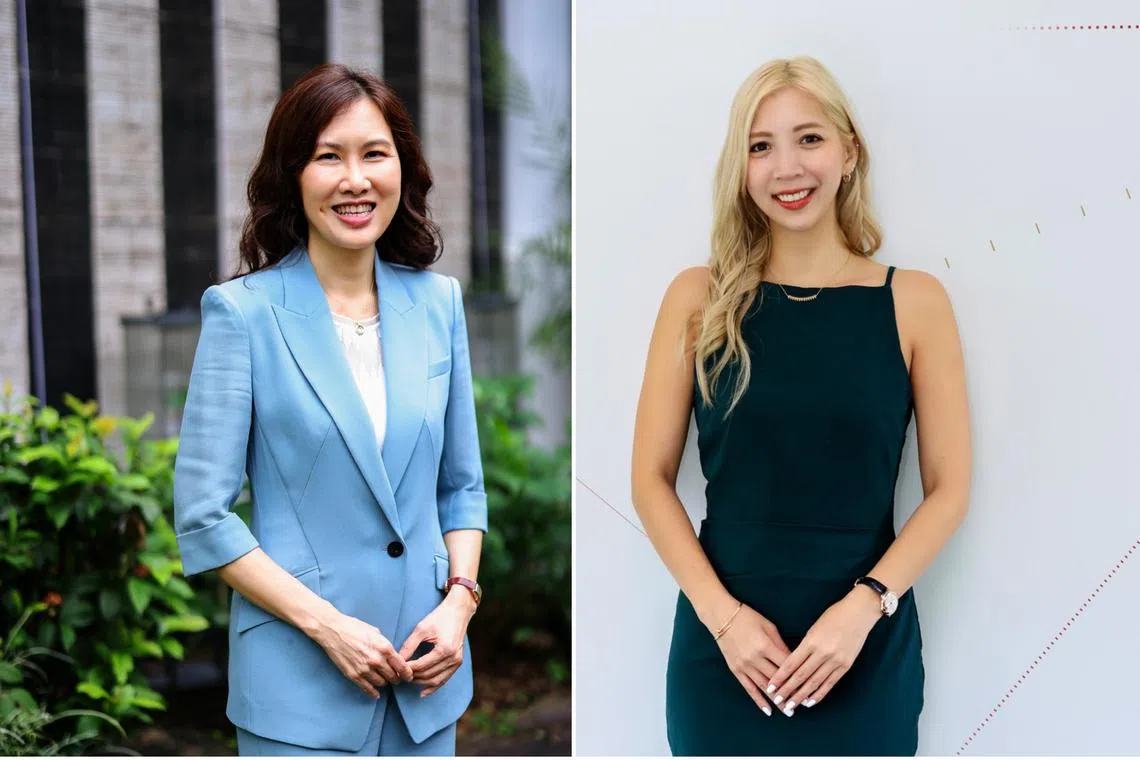
Dr Lynne Lim of NousQ (left) and Ms Marina Tran-Vu, founder of plastic-free brand Equo.
PHOTOS: CARTIER
Follow topic:
SHENZHEN, China – Thirty-three female changemakers were celebrated at the 2024 Cartier Women’s Initiative (CWI) awards ceremony
The Straits Times sits down with two fellows from South-east Asia to find out what inspired their enterprising journeys.
Dr Lynne Lim, NousQ
It was on a humanitarian mission in rural Cambodia that Singaporean ENT (ear, nose and throat) specialist Lynne Lim found her calling as a medtech entrepreneur.
White gun in hand, the first-prize winner of CWI’s Science & Technology Pioneer Award is the founder of start-up NousQ and the brains behind CLiKX – the world’s first handheld robotic device that allows doctors to insert ear tubes with the click of a button in a second.
It was 2009, and she had been carrying out consultations and neck tumour surgery for children in a village just outside Phnom Penh, Cambodia. Resources were scant, and she administered local anaesthetic injections for the surgery.
The next day, there were hundreds of kids who had trekked over mountains to seek treatment from her, the 55-year-old tells ST. “But all they had was this very simple condition called middle-ear infection, or glue ear.”
Glue ear occurs when fluid builds up behind the eardrum, in the middle ear space, which can lead to hearing loss and brain infections.
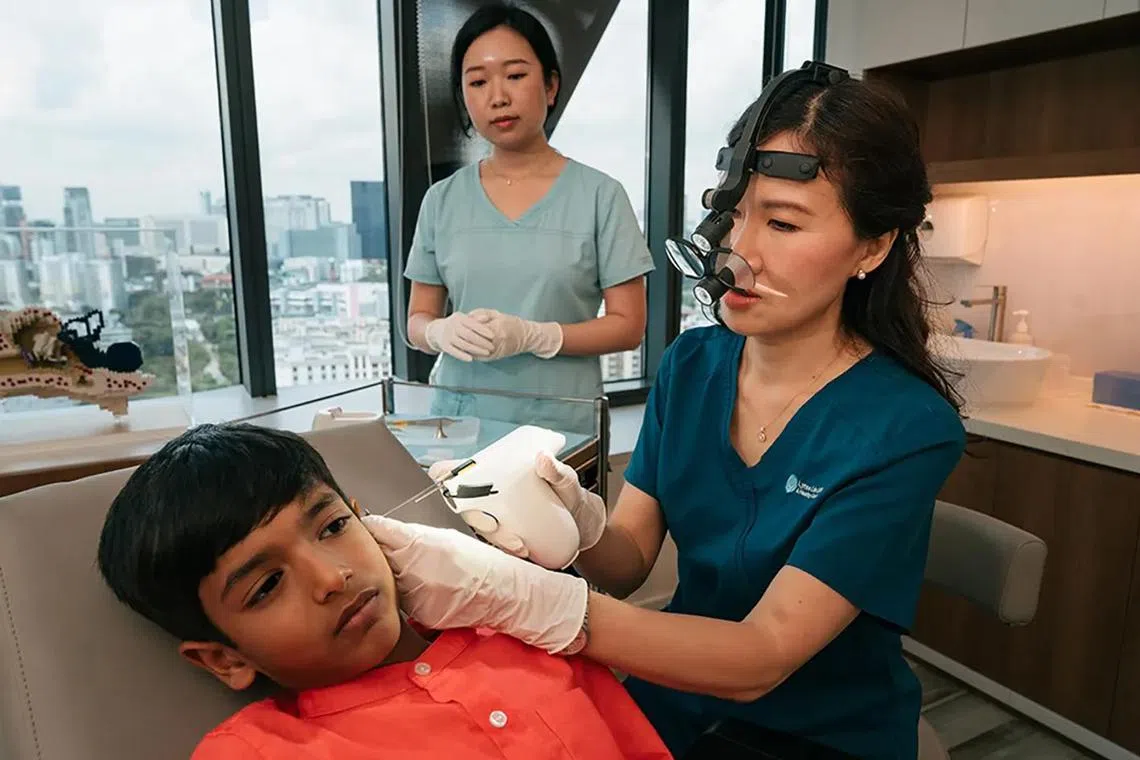
ENT doctor Lynne Lim of NousQ developed CLiKX, a surgical device that easily treats the medical condition known as glue ear, with the click of a button in a second.
PHOTO: CARTIER
“They came for this, and I could do nothing. We would need six to seven different instruments, general anaesthesia, a big operating theatre and a big surgical microscope that costs hundreds of thousands of dollars. I had to turn all of them away,” says Dr Lim.
The setback haunted her after she returned to Singapore. She realised it was “not a poor man’s problem”.
Middle ear infection is the leading cause of hearing loss in kids, and the most common reason they see doctors for surgery. About 120 million procedures are needed worldwide, but only about 18 million are done every year – mostly due to prohibitive costs and long waiting times, she says.
“It’s just not a high glamour operation like heart or brain surgery. There are very few innovations in the ear field.”
One day, Dr Lim, who is married to a lawyer, took their daughter, then eight, to get her ears pierced – and was amazed when the procedure took all of two clicks from a piercing gun.
“It was so near (on the ear) to where I wanted to do surgery. So I thought, I want a device just like that.”
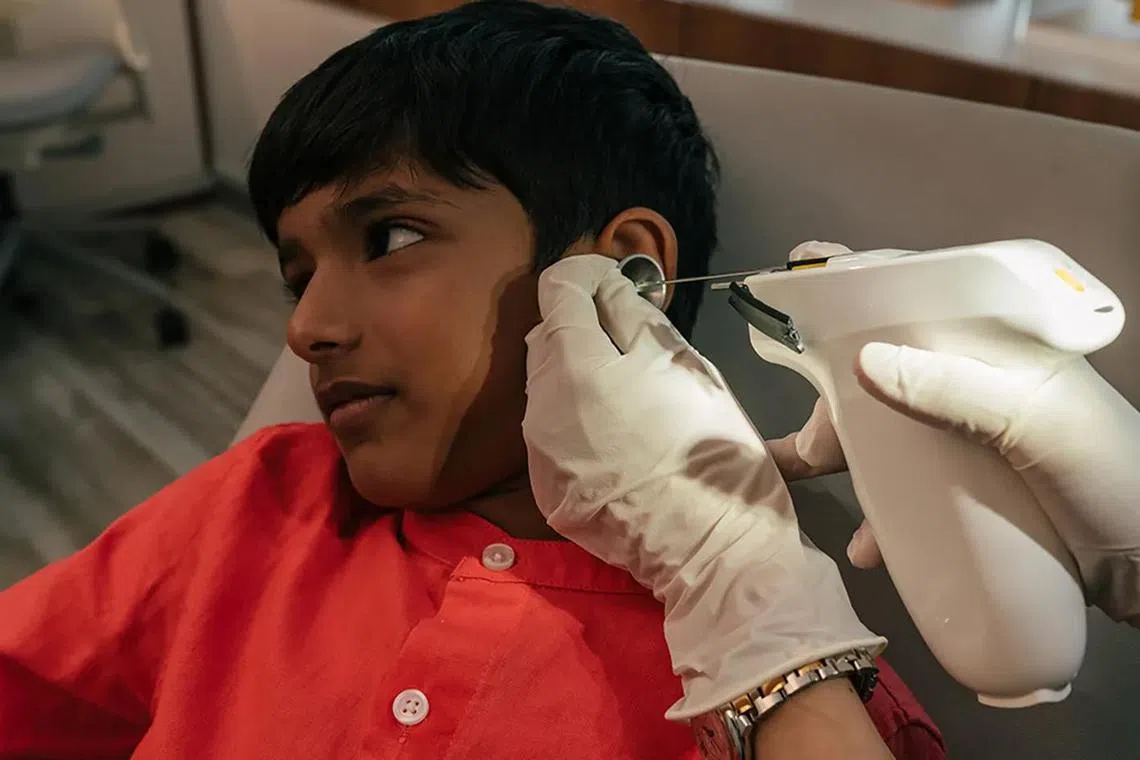
Dr Lynne Lim demonstrating her surgical device CLiKX on a patient.
PHOTO: CARTIER
The NUS Medicine graduate – who was teaching at the university and working at National University Hospital (NUH) at the time – sought out Singaporean engineer Gan Chee Wee to turn her dream into reality.
She put Mr Gan on her payroll and involved him in patient consultations, hearing evaluations, surgery and cadaver studies to better understand the process and challenges.
“My brief to him was, ‘I don’t care what you do, just give me a gun that can do this at the click of a button.’ He told me, ‘Don’t be crazy, it can’t be done,’” she recalls with a laugh.
But do it they did – after making countless 3D models of ears and 20 device prototypes over 10 years.
CLiKX recently passed a pilot clinical human trial at NUH, showing its safety and ability to insert an ear tube under local anaesthesia, bypassing the need for an operating theatre.
Money talks
It took more than a decade of research and chasing grants before Dr Lim and Mr Gan co-founded NousQ during the pandemic in 2021. They joined accelerator programmes and medical device challenges to test new markets and gain mentorship.
But the toughest hurdle had always been funding. In the early days, grant money from the Agency for Science, Technology and Research and National Research Foundation Singapore helped tide them over.
Things got trickier around 2018, when Dr Lim left as vice-dean of the medical faculty at NUS and vice-chairman of the medical board at NUH – stunning fellow faculty members – to join the private sector after 20 years in public practice.
Though she loved public practice, she was overwhelmed by management duties that left no time for her own research.
But working for herself at her own clinic, Dr Lynne Lim ENT & Hearing Centre, came with trade-offs.
“Now that I was out of the public sector, nobody wanted to give me a grant. In Singapore, people think when you go private, you’re not going to do research, that you’re just going to concentrate on earning money.”
Yet she has seen experienced colleagues in the private sector who are “untapped because they can’t get grants”.
“If we’re able to pull the public and private sectors closer together, we can innovate a lot faster.”
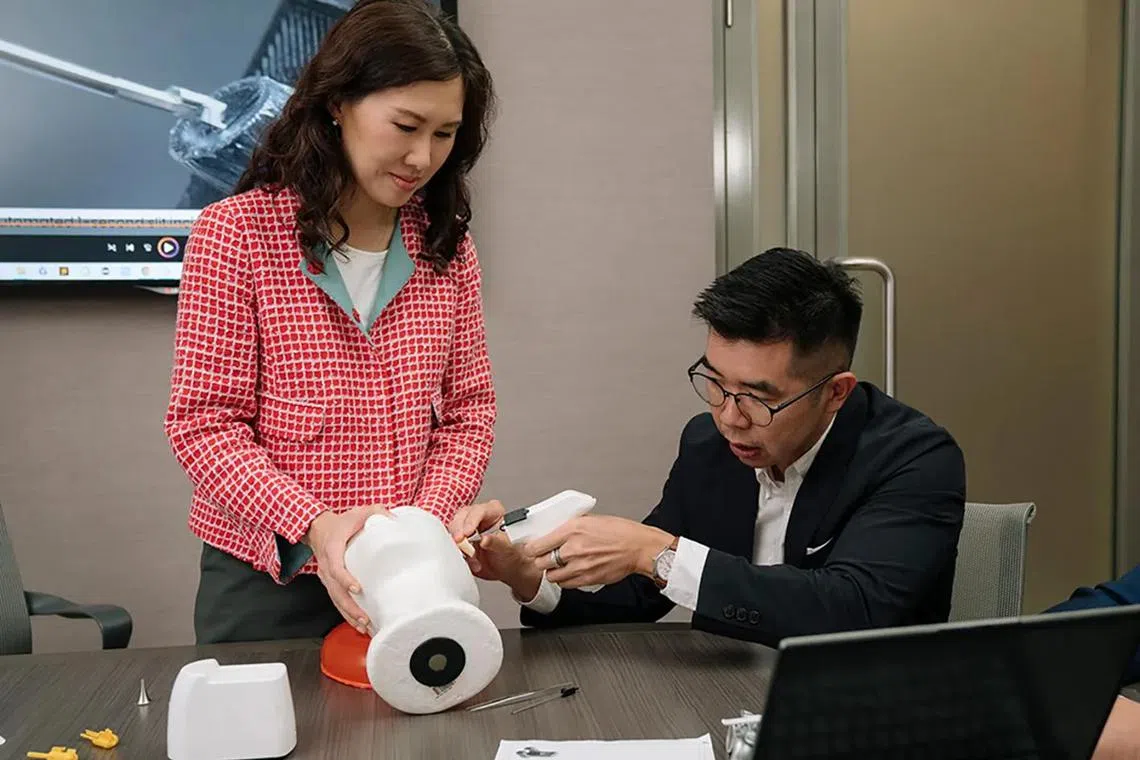
Dr Lynne Lim left a prestigious career in public healthcare to find solutions to accessible ear surgery and start medtech company NousQ.
PHOTO: CARTIER
The medical device ecosystem in Singapore is still in its infancy stage, with the nation more invested in developing fintech, healthtech and, more recently, climate and agriculture, Dr Lim notes.
“People don’t realise it’s a very long, rigorous process to R&D invasive surgical devices and get it to a safe stage to be used on humans. But investors want to see proof, traction and customers before they give you funds. So a lot of companies die in the early stages.”
Fund-raising was especially difficult in 2023, when start-up funding reportedly went down 90 per cent, she adds.
Today, many of her investors are doctors and individuals in healthcare and finance who believe in her cause.
Existing medical devices are also more diagnostic in nature, with few or no surgical device companies in Singapore, she says.
“Because of that, I had a hard time finding real mentors and support. A lot of times, I had to reach out to the US, but it was hard to just cold-call doctors.”
She is grateful to have found a community among the CWI fellows past and present, who have taught her new skills, such as how to pitch specifically to impact investors.
Most significant is the access to connections in various countries – from Britain to Nigeria. “This has plugged me into the whole world. The Cartier credibility and network have just opened so many doors.”
NousQ has currently raised half of its US$6.5 million (S$8.8 million) goal, to help start FDA (Food And Drug Administration)-pivotal trials of CLiKX in the US. The regulatory approval would fast-track the device’s acceptance in numerous markets.
She aims to have the game-changing product on the market by 2026. With a rechargeable battery, it is also good for thousands of uses – making it cost effective, “so it can help both developed and developing countries”, she says.
With the grant money from Cartier, Dr Lim is looking forward to giving free devices to a yet undecided but in-need market. “My dream is to one day just sling this device around my body and go up the mountains to treat people.”
Marina Tran-Vu, Equo
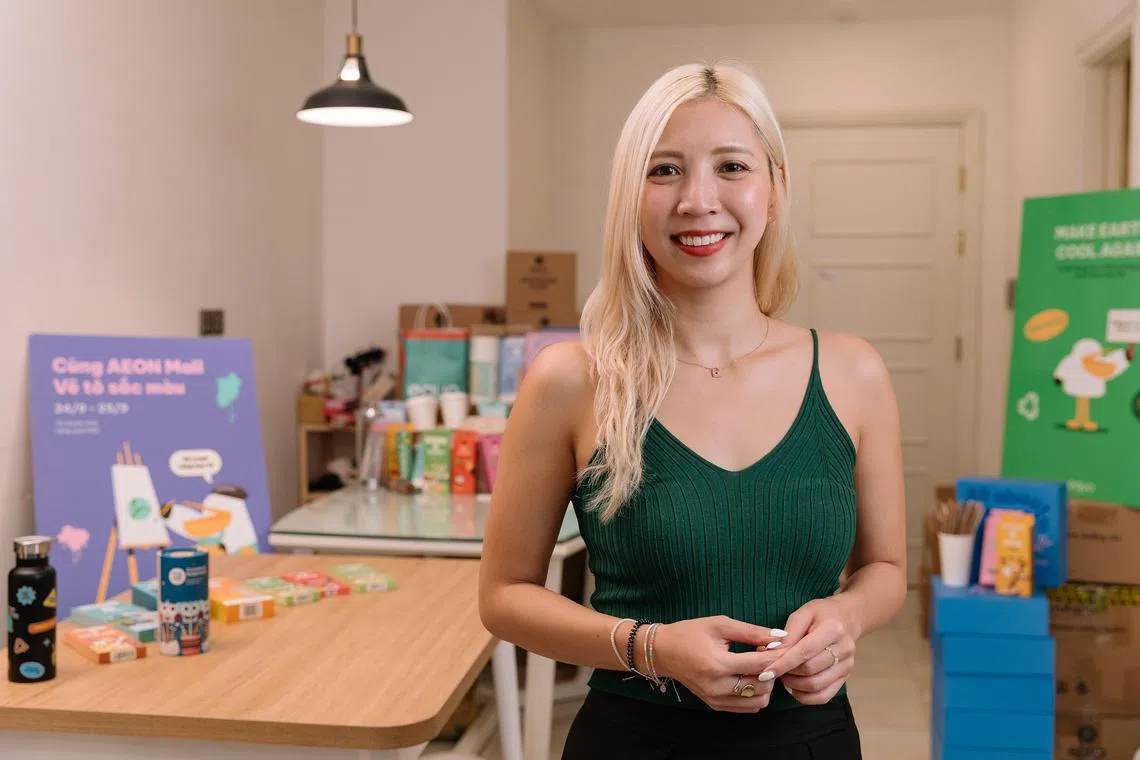
Ms Marina Tran-Vu, founder of sustainable, plastic-free brand Equo.
PHOTO: CARTIER
Whenever someone asks what the pivotal moment was to ditch her corporate career and start a sustainable brand, Ms Marina Tran-Vu always points to her five-year-old nephew.
“I never thought babies could be so cute, but after he was born in 2019, I realised I would do anything for this little bundle of joy. It really shifted my perspective to try to do something good while I’m on this planet,” says the founder of plastic-free solutions company Equo, which took third place in the South Asia category at the 2024 CWI and a US$30,000 (S$40,500) grant.
Equo produces compostable everyday products made of materials such as coffee and sugarcane, to replace single-use plastics.
Seeing the garbage and plastic pollution at beaches and in parks in her home country of Vietnam also compelled Ms Tran-Vu to leave her career in marketing and brand management behind for good, in pursuit of one that would benefit the environment.
Born and raised in Canada, the 35-year-old relocated to Ho Chi Minh City in 2019 when her father was diagnosed with stage three lung cancer.
While exploring the city for the first time, she went cafe-hopping – and was surprised to find a grass straw in her juice. She dug deeper and was struck by the history behind grass straws.
Farmers working in the fields for long hours under the hot sun would crack open a coconut to quench their thirst, and use hollow grass tubes as straws.
“It was sustainable but not because it was intended that way; it was just something that made sense. I questioned why this was not made readily available and commercialised overseas.”
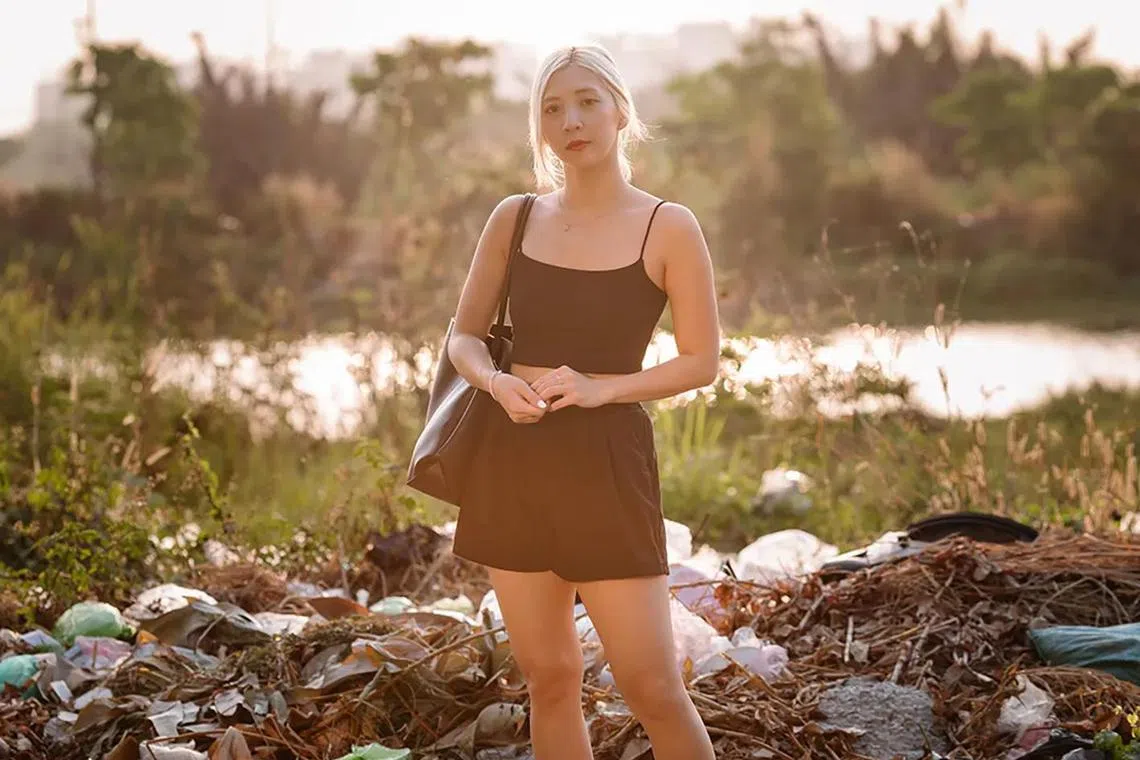
Ms Tran-Vu was compelled to switch to a career finding sustainable solutions after witnessing the pollution in Vietnam.
PHOTO: CARTIER
It also seemed unfair that Vietnam was suffering from a plastic pollution crisis.
“North America or Western society hide their pollution a lot better. Unfortunately, a lot of it gets shipped to marginalised communities on shorelines and developing countries,” she adds wryly.
“Vietnam is a great place for innovation, but not a lot of people look at it as a country that is capable of that. They still think of it as war-torn, third-world and unsafe – and that’s a perception I really wanted to change.”
Realising that convenience was a barrier to changing lifestyle habits, she set out to create eco-friendly alternatives to everyday plastic products that would help people live sustainably without the bother.
She launched Equo (shopequo.com) in 2020 with four types of straws made from grass, rice, coconut and sugarcane. These single-use straws are manufactured in Vietnam and Taiwan by local communities – and do not require washing.
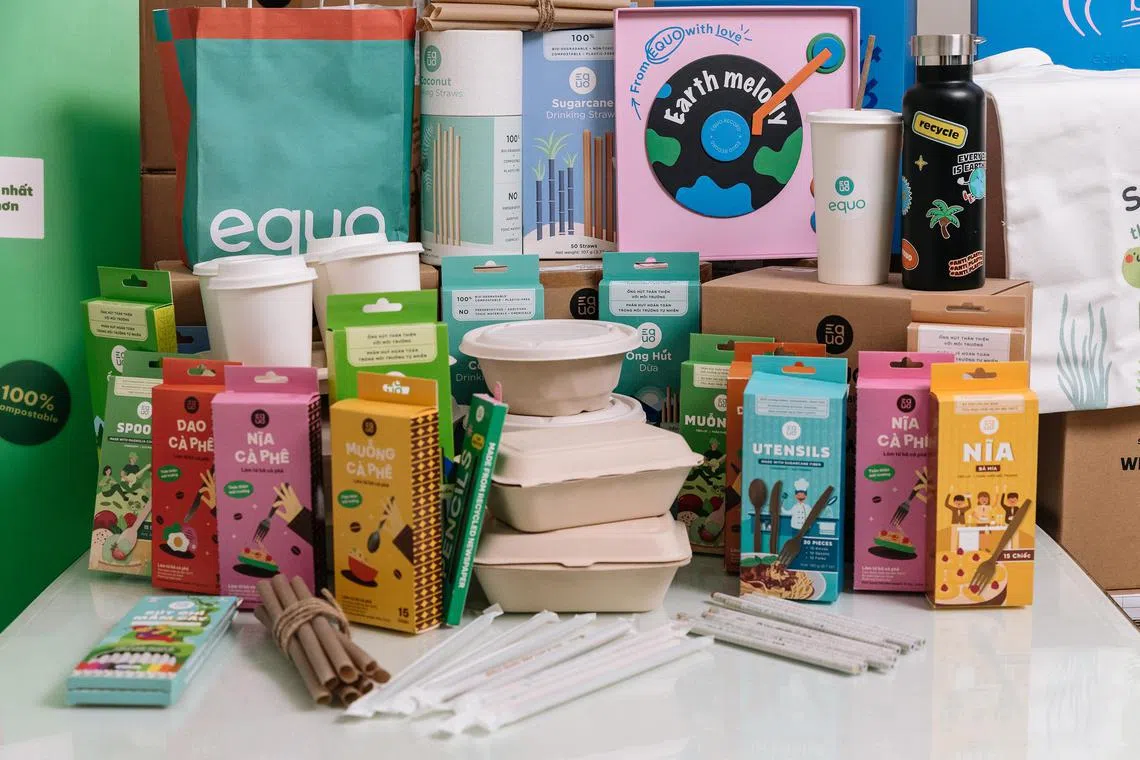
Equo’s sustainable, plastic-free products include straws and utensils made from sugarcane, grass and coffee.
PHOTO: CARTIER
The plan was to run Equo on a business-to-business model, but shortly after raising US$12,000 on crowdfunding platform Kickstarter, the Covid-19 pandemic hit.
The global lockdowns that shut dining establishments everywhere forced her to pivot to a direct-to-consumer model instead. Equo survived the first year by solely selling directly to consumers.
Traction picked back up, particularly after Ms Tran-Vu appeared on Season 4 of business reality television series Shark Tank Vietnam in 2021. “I got an offer from one of the ‘sharks’ (venture capitalists) that didn’t go through, but it was great PR,” she says of the experience.
The exponential increase in global awareness on sustainability has also worked in her favour.
Sustainability at the time of Equo’s founding was still a new concept that “people wanted to participate in but were afraid of getting wrong”, she recalls.
“There was an all-or-nothing dogma around it, which made the category very intimidating. I think that shaped why I built the brand to be a little more fun and inclusive, and how every small action you take is good and in the right direction.”
Education has since increased hundredfold, and the business has been “helped along the way with a lot of government regulations that have enacted taxation”, such as carbon taxes.
Ms Tran-Vu acknowledges that sustainable living can still be cost-prohibitive.
“Pricing, I think, will always be a problem. Plastic has the benefit of economies of scale. Sustainable materials are still quite new. If consumers can be patient and give us a bit more time, then the pricing can get down to something that makes sense.”

Ms Tran-Vu was first inspired to start plastic-free brand Equo after discovering grass straws in Vietnamese cafes.
PHOTO: CARTIER
As a solo, first-time entrepreneur, she faced no lack of challenges.
She was also often the only female CEO in accelerator programmes. It meant she had to work extra hard to convince investors she was the right person to solve the problem. Some would ask her “odd” questions during pitching sessions.
“On Shark Tank, one ‘shark’ asked me if I was married or planning to,” Ms Tran-Vu, who is in a relationship, recalls.
“They didn’t air this, but after, a lot of people told me that investors ask this because they want to see how long you’re in this for, and if you have children, will running your business be possible?”
Imposter syndrome also meant she was not valuing her company high enough until recently.
The situation is improving, she says. “I see that people have really been putting in effort and resources to try to enable female founders. The only area that really needs a lot of improvement is on the decision-making side. There’s still a lot of potential bias among investors giving funds.”
In 2022, she raised her first million – US$1.3 million in seed round – to expand her product line and reach.

Ms Tran-Vu hopes to take Equo, currently in 15 markets, worldwide.
PHOTO: CARTIER
Though it is early days as a CWI fellow, she has already gleaned priceless mentorship.
The tailored coaching and specific feedback have helped her be a better presenter who knows her worth, says Ms Tran-Vu, who also feels “immense pressure to perform up to standards” as CWI’s first Vietnamese fellow.
To date, Equo is selling to both businesses and consumers in 15 countries, and has been able to replace more than 30 million pieces of plastic in the environment, she says. And now Cartier’s grant will come in handy in expanding her offerings and entering more markets and delivery channels.
“I want to be seen as a real, profitable business, and not just a social enterprise.”


